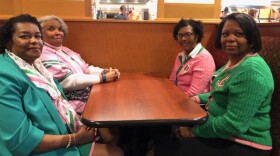For generations, the trade of enslaved Africans fueled Virginia's economy, and Richmond was once once the hub of that market. For those who want to confront that difficult past, there’s the Richmond Slave Trail.
It’s a dark summer night, with a sliver of a moon. A line of people carrying torches stand alongside the James River just outside downtown Richmond.
The group has gathered for an immersive experience, the Elegba Folklore Society’s “In the Beginning” slave trail tour. About 35 people are here with Coming To the Table, a Virginia-based national organization that encourages and facilitates racial healing.
They’re lined up and tied together, simulating the iron shackles that once chained enslaved Africans. Janine Bell, president of the Elegba Folklore Society stands before the group.
“Spanning nearly 350 years the Trans-Atlantic trade displaced more than 12 million Africans from their native lands to foreign soils,” she says. “By the end of the 18th century Virginia was wholly committed to the practice of slavery.”
Repeat after me, she calls out and the group choruses back: “Today I know, today I grow.”

The group begins to walk. A man posing as the slave driver yells and cracks a whip. Heads down the line shuffles into the undergrowth.
“Enslavement wasn’t comfortable,” Bell says. “Not one day.”
The Elegba Folklore Society, a nonprofit in Richmond that teaches the legacy of African culture in American society, has run these tours for more than twenty years for interested groups. They recently received a grant that will allow them to run one a month.
“If we can reach people at a feeling place, which is our intention, even if they take it in their head. They process it in their spirit, in their core, in their center,” says Bell.
Back in downtown Richmond, it’s nearing midnight and the group has just finished their tour. Malissa Short is from Richmond, but had never walked the trail before.
“I found it to be reflective, that our narrator begin to sing along the trail the African songs,” says Short.
Her ancestors were enslaved. Her parents active in the Civil Rights movement. For Short, hearing those songs brought memories that were both soothing and disturbing.
“Because the memories of what (my parents) experienced,” Short says. “I even have my mother’s card, it’s a card that allowed her to vote because she paid her five dollars. I have her card. I know that she walked with Dr. King in the first March on Washington.”
Helping people connect the past and the present is one goal of the tour. The other is touching people in their spirit, because says Janine Bell, that’s where change happens.
This report, provided by Virginia Public Radio, was made possible with support from the Virginia Education Association.



